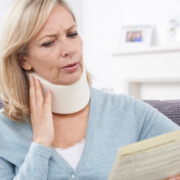When you rent an apartment, you’re not just paying for a place to live—you’re paying for safety, security, and peace of mind. But when a dangerous condition, criminal act, or maintenance failure causes serious injury, tenants and visitors are often left wondering: Can I sue my apartment complex for an injury in Mississippi?
The answer depends on several legal factors, but in many cases, yes—you can file a premises liability lawsuit if the injury was caused by negligence on the part of the apartment’s owner, property manager, or security provider.
At Barrett Law, PLLC, we represent victims of apartment injuries and violent incidents across the state of Mississippi. Whether you were hurt in a slip and fall, fire, assault, or any other preventable event, Jonathan Barrett, a Mississippi apartment injury lawyer with decades of experience, will help you pursue full financial compensation for your losses.
This blog explains when and how an apartment complex may be liable, what your legal rights are under Mississippi law, and what steps you should take if you’ve been injured.
Common Reasons Tenants and Guests Are Injured at Apartment Complexes
Apartment injuries can happen in many different ways. Some involve accidents caused by poor maintenance or code violations. Others involve violent crimes in poorly secured properties.
Common incidents include:
-
Falls caused by broken stairs or uneven walkways
-
Burns or smoke inhalation from electrical fires or lack of fire alarms
-
Assaults or shootings due to negligent security
-
Dog bites from dangerous animals not controlled by other tenants
-
Collapsing ceilings or porches due to poor structural upkeep
-
Electrocution or carbon monoxide poisoning from faulty systems
-
Children injured in unsupervised pools or unsafe playgrounds
In each case, the question is: Did the property owner fail in their legal duty to maintain a safe environment?
When Can You Sue an Apartment Complex for an Injury in Mississippi?
You can sue an apartment complex if your injury was caused by:
-
Negligent Maintenance or Repairs – Failing to fix known hazards like broken stairs, or leaking pipes.
-
Code Violations – Violating city or state safety codes, such as not having smoke detectors or locking gates.
-
Negligent Security – Failing to provide adequate lighting, cameras, or security personnel in high-crime areas.
-
Failure to Warn – Not warning tenants or visitors about dangerous conditions.
-
Failure to Respond to Complaints – Ignoring repeated tenant requests or maintenance reports about dangerous issues.
Mississippi law allows injured tenants, guests, and even workers (like delivery drivers) to file premises liability lawsuitsif they are harmed due to unsafe conditions on a property.
Who Can Be Held Responsible in an Apartment Injury Case?
Multiple parties can potentially be held accountable:
-
Landlord or Property Owner – The entity that owns the building and is legally responsible for maintaining it.
-
Property Management Company – Third-party companies hired to oversee daily operations and safety compliance.
-
Maintenance Contractors – If poor repair work caused your injury, the contractor may share in the liability.
-
Security Firms – If a security company failed to respond to threats, monitor video feeds, or patrol the property, they may be named in the lawsuit.
-
Other Tenants – If another tenant’s negligence or criminal behavior caused your injury (e.g., arson or dog attack), they may also be held liable.
Legal Responsibilities of Apartment Owners Under Mississippi Law
Mississippi premises liability law requires apartment complex owners to:
-
Maintain reasonably safe conditions for tenants, guests, and anyone lawfully on the property
-
Inspect the property regularly for hazards
-
Repair dangerous conditions promptly
-
Warn residents of known dangers
-
Take reasonable steps to prevent foreseeable crime in areas where violence is known to occur
If they fail in these duties and someone is harmed, they can be held financially liable.
What Does “Foreseeability” Mean in Apartment Injury Claims?
In apartment shooting or assault cases, the key legal issue is often foreseeability. That means asking:
-
Were there prior incidents of similar crime on or near the property?
-
Did tenants complain about security issues?
-
Did the property have broken locks, missing cameras, or no security guards?
If so, the owner may have known—or should have known—that residents were at risk.
Mississippi courts have repeatedly allowed lawsuits against apartment complexes when crimes occurred on properties with a history of violence, and no action was taken to improve safety.
Examples of When You May Have a Valid Claim
-
You fell in a poorly lit stairwell where the landlord ignored prior complaints about the lightbulb being out.
-
Your child was injured due to a broken swing in the apartment playground that was never repaired.
-
You were shot during a robbery in the parking lot of a complex known for frequent police calls and had no security guards on duty.
-
Your apartment caught fire due to faulty wiring or missing smoke detectors, and you suffered burns or smoke inhalation.
-
You slipped on ice outside your unit, and the property had failed to salt or warn of hazardous walkways.
Who Can File an Apartment Injury Lawsuit?
-
Tenants – The person listed on the lease has the right to sue for injuries caused by negligence.
-
Family Members or Guests – Visitors who were lawfully on the premises may file a claim if harmed.
-
Delivery Drivers, Contractors, or Vendors – If they were invited or permitted on the property, they’re protected too.
-
Surviving Family Members – In fatal cases, a wrongful death claim may be filed by a spouse, parent, or child.
What Compensation Can You Recover?
If you’ve been injured in an apartment complex due to negligence, you may be entitled to compensation for:
-
Medical expenses (past and future)
-
Lost wages and loss of future earnings
-
Pain and suffering
-
Emotional trauma and PTSD
-
Disability or disfigurement
-
Property damage (if applicable)
-
Wrongful death damages (if a loved one died)
-
Punitive damages (in cases of extreme recklessness)
At Barrett Law, PLLC, we build strong, evidence-backed cases to pursue every dollar our clients are owed under Mississippi law.
What Should You Do After an Apartment Injury in Mississippi?
-
Report the Incident Immediately
-
Notify the property manager or landlord in writing. Request an incident report.
-
-
Seek Medical Attention
-
Even if you think the injury is minor, have it documented. Medical records are key evidence.
-
-
Take Photos
-
Document the scene, injuries, property conditions, and any hazards.
-
-
Collect Witness Information
-
Get contact info from neighbors, friends, or maintenance workers who saw what happened.
-
-
Do Not Sign Anything
-
Some landlords or insurance companies try to get you to sign releases—speak with an attorney first.
-
-
Call a Mississippi Apartment Injury Lawyer
-
You have a limited time to take legal action. Early legal representation helps preserve evidence and protects your rights.
-
Frequently Asked Questions
Can I sue if I tripped and fell on the apartment steps?
Yes, if the steps were broken, poorly lit, or improperly maintained and the landlord failed to fix the issue after being made aware—or should have known about it—you may have a valid premises liability claim.
What if the injury happened inside my own unit?
You may still have a case if the injury was caused by a defective condition the landlord failed to fix, such as faulty wiring, collapsing ceilings, or plumbing issues.
Can I sue if I was the victim of a crime at the complex?
Yes. If the apartment complex failed to provide proper security in an area with a known risk of violence, you may be able to sue for negligent security.
Is my landlord responsible for another tenant’s dog that bit me?
Possibly. If the landlord knew the dog was dangerous or had received complaints and failed to act, they may share liability with the dog owner.
What if I fell because of ice or snow?
If the property didn’t salt or clear walkways and the hazard was foreseeable, they may be liable. Landlords have a duty to maintain safe walkways under Mississippi law.
How long do I have to file a lawsuit in Mississippi?
Generally, you have three years from the date of injury to file a premises liability claim. However, it’s best to act quickly so evidence isn’t lost and witnesses don’t disappear.
Can I sue if I wasn’t a tenant but was visiting someone at the complex?
Yes. Visitors have the same rights to safe premises as tenants, as long as you were lawfully on the property.
How much is my case worth?
Every case is different. Factors include the severity of your injuries, the cost of your medical care, lost wages, and whether the landlord’s conduct was particularly reckless.
Do I need a lawyer, or can I file a claim myself?
You can file a claim without a lawyer, but apartment injury lawsuits are complex and usually require legal knowledge and investigative work to succeed. An experienced attorney can identify all sources of compensation and negotiate with the landlord’s insurer effectively.
How do I pay for a lawyer if I’m injured and can’t work?
Barrett Law, PLLC handles injury cases on a contingency fee basis—you pay nothing unless we recover money for you.
Harmed on an Apartment Complex in Mississippi? Call Mississippi Apartment Injury Claim Attorney Jonathan Barrett 24/7/365 at (601) 790-1505 for Your FREE Consultation
If you were injured at a Mississippi apartment complex due to unsafe conditions, poor security, or a landlord’s failure to act, you may have the right to hold them legally responsible. At Barrett Law, PLLC, we represent clients across Jackson, Gulfport, Southaven, Hattiesburg, Biloxi, Olive Branch, Tupelo, Meridian, Pearl, Madison, Greenville, Oxford, Clinton, Horn Lake, Brandon, and every corner of Mississippi.
Call (601) 790-1505 now to speak with Attorney Jonathan Barrett, an experienced apartment injury lawyer who will stand up to negligent landlords and insurance companies on your behalf.
Your consultation is free. We’re available 24/7/365. Let us help you pursue justice and recover the compensation you deserve.







